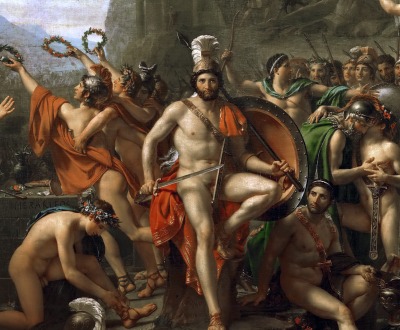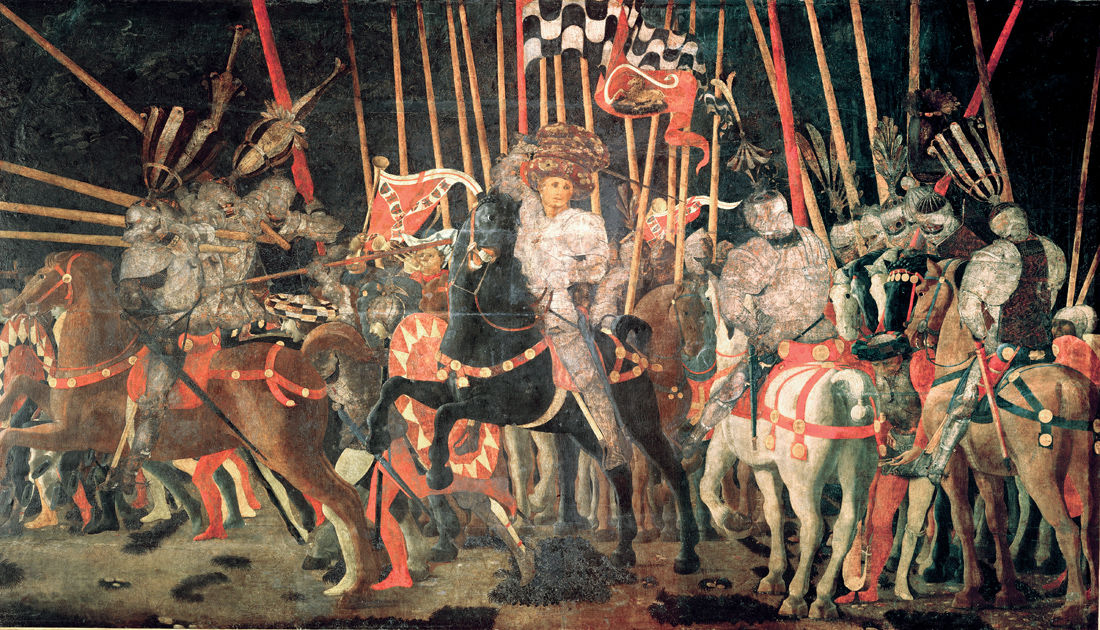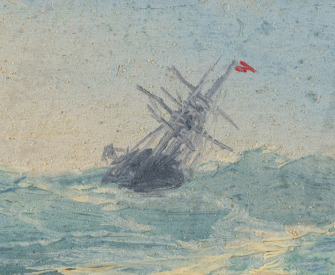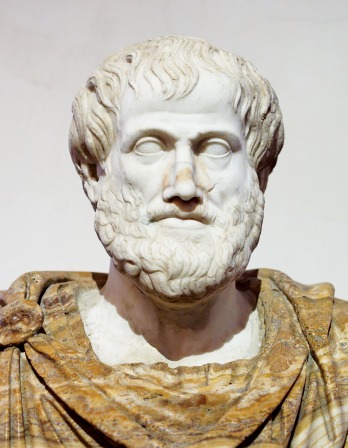I have loved war too well.
—Louis XIV, 1715The Persian Way of War
Unlike the Greeks, Xerxes viewed war as more than a simple matter of strategy. Rather, it was a means of flaunting global mastery.
By Tom Holland

Leonidas at Thermopylae, by Jacques-Louis David, 1814. Louvre Museum, Paris.
History, like poetry, began with war. In around 440 BC, some three centuries after Homer, singing the wrath of Achilles, composed the Iliad, a Greek by the name of Herodotus embarked upon a project no less epic. His goal was to explain what would now be termed “the clash of civilizations,” the inability of the peoples of East and West to live together in peace. Asiatics, so Herodotus reported, “believe that the Greeks will always be their enemies.” But why they should have come to this conclusion in the first place was, he acknowledged, a puzzle. Perhaps the kidnapping of a princess or two by Greek pirates had been to blame? Or the burning of Troy? “That, at any rate, is what many nations of Asia argue—but who can say for sure if they are right?” As Herodotus well knew, the world was an infinite place, and one man’s truth might easily be another man’s lie. Yet if the origins of the conflict between East and West appeared lost in myth, then not so its effects. These, at least, had been made all too recently and tragically clear. Difference had bred suspicion—and suspicion had bred war.
A war like no other. In 480 BC, some forty years before Herodotus began his history, Xerxes, the King of Persia, had led an invasion of Greece. Military adventures of this kind had long been a speciality of the Persian people. Victory—rapid, spectacular victory—had for decades seemed to be their birthright. As a result of his predecessors’ triumphs, Xerxes had ruled as the most powerful man on the planet. The resources at his disposal were so stupefying as to appear virtually limitless. Europe was not to witness another invasion force to rival his until World War II and the summer of D-Day.
Set against this unprecedented juggernaut, the Greeks were few in numbers and hopelessly divided. Even the two leading Greek powers, the nascent democracy of Athens and the sternly militarized state of Sparta, appeared ill-equipped to put up an effective resistance. With the Persian King resolved to pacify once and for all the fractious and peculiar people on the western margin of his great empire, the result seemed to most a foregone conclusion. And yet somehow, astonishingly, against the largest expeditionary force ever assembled, the Greeks held out. The invaders were turned back. Greece remained free.
The story of how they had taken on a superpower and, unbelievably, defeated it, appeared to the Greeks themselves the most astounding achievement of all time. How precisely had the victory been won? And why? And what might have caused the invasion to be launched in the first place? Not lacking in significance even four decades later, these questions prompted Herodotus into a momentously novel style of investigation. For the first time, a chronicler set out to trace the origins of a conflict—not to a past so remote as to be utterly fabulous, nor to the whims and wishes of some god, nor to a people’s claim to a manifest destiny, but rather to explanations that he could verify for himself. Herodotus’ term for the task he set himself was “inquiries”—historia. “And I set them down here,” he declared, in the first sentence of the first work of history ever written, “so that the record of human achievement may be spared the ravages of time, and so that everything significant and astounding, all those exploits by which Greeks and non-Greeks alike have made a mark, can be kept in the public eye—and additionally, and most importantly, so that I can trace the steps that led them into conflict.”
What gave added urgency to this project was the fact that, as Herodotus well knew, “the ravages of time” were already serving to erase the marks of the war. Anyone who doubted this had only to visit Athens and look up at the Acropolis, the mighty rock that dominated the city. For centuries, this had served as the storehouse of Athenian memories—an incomparable repository of shrines, statues, and trophies—until in 480 BC, during the course of the great invasion, Xerxes’ armies occupied the city, captured the Acropolis, and put it to the torch. All its treasures were incinerated. Some months later, shortly before the climactic battle of Plataea in which the Persian threat was ended once and for all, the Greek allies—the Athenians, of course, prominent among them—had sworn a solemn oath, that any “ground zero,” any temple burned by the invaders, was to be left permanently as a ruin, “to serve as a witness for generations yet to come.” So it was for thirty years that the summit of the Acropolis had been left a blackened pile of rubble—until the Athenian people, repenting of their vow, voted to redevelop the sacred rock.
Their goal in doing so was quite consciously to rewrite history. The role of the Athenians in the great victory over Persia was to be blazoned; that of their allies, and of the Spartans in particular, put thoroughly in the shade. So it was, for instance, that the most sumptuous and celebrated of all the new grands projets, the temple that subsequent ages would call the Parthenon, was raised on the foundations of an older, unfinished building, one that had been begun in the 480s BC as a celebration of the victory won by the Athenians, and the Athenians alone, at Marathon. So it was too that by the entranceway to the Acropolis, a colossal statue of Athena was raised, its eyes turned serenely westward, toward the straits of Salamis where the lead in sinking the Persian battle-fleet had been taken, of course, by none other than the Athenians. The whole spectacular makeover, that entire extraordinary array of monuments which remains to this day the very symbol of classical Greece, was designed to serve above all as a war memorial—to the dead, yes, but also to the deathless glory that they had won in battle for their city.
How, then, could the Spartans, originally the allies of the Athenians against the Persian king, but now their bitterest rivals, possibly compete with the Parthenon? Not by raising monuments of their own, to be sure, for it was their custom to scorn masonry as pompous and marble as frivolous. It did not necessarily require great architecture, however, to commemorate a victory—or even a defeat. “Go tell them in Sparta, O passer-by / That here, in obedience to their orders, we lie.” These lines, carved on a simple stone memorial, were to be read on the site of the most famous engagement of the entire Persian Wars, an engagement that had ended, not in triumph, but in heroic failure. Teeming hordes of Asiatics, driven forward into battle by the whip; a Spartan king, Leonidas, resolved to fight or die an exemplary death, as he and some three hundred of his countrymen made a suicidal last stand—the story of Thermopylae had it all. Already, even as Herodotus embarked upon his researches, it had begun to take on the force of myth. Some evidence suggests that the historian, when he came to write his account of Thermopylae, was consciously attempting to avoid sensationalizing it and to purge it of Spartan spin. If so, he did not altogether succeed. His description of the battle has an indisputably epic, even Homeric, glow. Describing the aftermath of Leonidas’ death, for instance, Herodotus has the Spartans and the Persians fight over the corpse, precisely as though they were combatants on the plain of Troy. So strong is the force of his narrative that even today, two and a half millennia after Leonidas fell, Thermopylae stands supreme as the paragon of heroism in war. When Hollywood wishes to dramatize the Persian invasions, it is not to Marathon or to Salamis, those incomparable victories, that it turns. If glory, as the Greeks believed, is the truest immortality, then it is the Spartans who have had the last laugh.
But if the Athenians would be infuriated to know this, then how much more so, of course, would be the Persians. As the outraged response in Iran to the movie 300 suggests, sensitivities about Thermopylae can still run high. And well they might, for the battle eulogized by the Spartans as a defeat so splendid as to outshine many a victory would no doubt have appeared to the Persians as a truly thumping military success. To flush out a pass held by heavy infantry, to take a mere two and a half days to achieve it, and to kill a Spartan king—these, by any reckoning, were splendid achievements. Doubtless a Persian would have been quick to point out as much. Except that no Persian is known to have written about the battle. Indeed, no Persian is known even so much as to have mentioned the invasion of Greece. Revisionists have deduced from this silence that perhaps the war which the Greeks themselves regarded as the most momentous of all time was seen by their opponents in a slightly less dramatic light, as a peripheral border skirmish, nothing more. Maybe. Yet it is important not to mistake the nature of the evidence. That the Persian sources opted to ignore a defeat is hardly surprising, but that they are no less silent about all their empire’s many glorious victories does appear truly astounding. And this not least because chronicling the triumphs of imperial warlords was a venerable tradition in the ancient Near East. Scribes at the Assyrian court, in particular, had competed with one another to describe the gallons of blood shed by the their royal masters, the cities stormed, the palaces looted, the prisoners enslaved or impaled. Yet the Persian kings, who in almost every other respect were assiduous borrowers from the traditions of Mesoptamia, chose not to borrow from the example of these sanguinary chronicles. Far from broadcasting the details of all their many victories, they seem rather to have turned their backs upon the very subject of war.
Why? Any attempt to answer this intriguing and suggestive question must draw upon the single exception that proves the rule. One narrative of a Persian king’s campaigns does exist, carved into a mountain in western Iran, on a sheer cliff face overlooking what is today the main road between Baghdad and Tehran. Bisitun was a place holy to the ancients, but that was not the only reason why Darius the Great, in 521 BC, ordered a massive inscription carved there, its huge blocks of cuneiform, as the travel writer Robert Byron put it, “cut like the pages of a book on the blood-colored rock.” To Darius, the site had a political as well as a spiritual significance. In 522 BC, a year before work on the inscription began, he and a group of six coconspirators had ridden past Bisitun on their way to a nearby fortress, where Bardiya, the King of Persia, had installed himself for the summer. Coming upon their royal lord as he lay in bed with a concubine, the assassins hacked him to death, and Darius seized the throne. It was an act of bloody treachery, plain and simple.

The Counterattack of Michelotto da Cotignola at the Battle of San Romano, by Paolo Uccello, c. 1455. Louvre Museum, Paris.
Or was it? The Bisitun inscription served to give the story a very different spin. According to Darius’ account, the victim of the assassination squad had not in fact been Bardiya at all. The true Bardiya was long dead. Taking his place upon the throne, unsuspected by anyone save for Darius himself, there had snaked a magus by the name of Gaumata, skilled in all the arts of blackest necromancy. The “Bardiya” killed by Darius, in short, had been a doppelgänger: a fake, a fraud, a liar. Which in turn, of course, was to cast Darius himself, not as a murderer, not as a usurper, but as a defender of truth. No more honorable role could possibly have been imagined, for the Persians knew, as more benighted peoples did not, that a universe without truth would be one undone and lost to perpetual night. Back in the beginning of time, when Ahura Mazda, greatest of the gods, first summoned creation into being, he had engendered Arta—Truth—to give order to existence. Without it, the universe would have lacked all form and value and beauty. Yet the work of Arta was never done—for perpetually it was shadowed by its opposite, Drauga, the Lie. Two orders—one of perfection, the other of falsehood, each the image of the other—were coiled in a conflict as ancient as time. What else could Darius worthily have done, then, but take the side of Arta against Drauga, Truth against the Lie, lest the universe itself should totter and fail?
So it was that he came to justify his usurpation by means of an innovative and fateful claim: that he, and he alone, was the appointed lieutenant of Ahura Mazda on earth. The global dominion of which he made himself the master was henceforward to be regarded as nothing less than a sacral image of the order of the universe, a beacon of truth and order lit to illumine all the world. Here was a formulation no less profitable than it was original, for what it provided, in effect, was a license to engage in conquest without limit. If it was indeed the god-given destiny of Darius to bring peace to a bleeding world, then what could those who opposed him be reckoned, if not the agents of anarchy and darkness—of an axis of evil? In 520 BC, when an ever fractious people named the Elamites rose for a third time in revolt, Darius, driven to fury, anathematized them in new and startling terms. “Those Elamites were faithless,” he ordered it proclaimed on the cliff face of Bisitun. “They failed to worship Ahura Mazda.” The condemnation of a people for their neglect of a religion not their own was something wholly remarkable. So too was Darius’ declaration that those sent to war against the rebels might expect “divine blessings—both in their lives, and after death.” The manifesto, novel though it was, proved thoroughly inspiring. The Elamites were crushed with a peremptory, almost dismissive, speed. Never again would they dare to challenge the awful might of the Persian king. Such was the devastating effect of the world’s first holy war.
Yet Darius, unlike the kings of Assyria or Babylon, had no interest in dwelling upon the specifics of his victory. What mattered to him was not the war, but the fact that the war had been won; not the bloodshed, but the fact that the blood had dried, and that an eternal age of peace had dawned. To be sure, the victory over Gaumata and his supporters had been a great and a terrible one, and because it proved that Darius was indeed the champion of Ahura Mazda—the great truth on which he founded his empire—the new king had ordered its details to be recorded and proclaimed. Never again, however, would he permit himself to be shown enclosed within mere events. Just as the Lord Mazda dwelt beyond the rhythms of the world, so did his proxy, the King of Persia, transcend space and time.
Which is why, essentially, there were no war correspondents at the court of the King of Kings, no chroniclers of all his many victorious campaigns. From the point of view of Darius—and of his son and heir, Xerxes—history had been brought to a glorious close. The empire of the Persians was both its end and its summation—for what else could a dominion be that contained within itself all the limits of the horizon, if not the bulwark of a truly cosmic order? Such a monarchy, redeemed as it had been from the Lie, surely could be expected to endure for all time, infinite, unshakable, the watchtower of the Truth. The King of Kings did not dwell upon diurnal banalities such as battles.
And yet there was an irony. A vision as imperious as that formulated by Darius naturally needed to be broadcast to the entire globe—and what better way to do that than by leading the empire to war? Thus, in the judgment of Xerxes, Greece had to be invaded. To shrink from risk, to confess that Persian power might be susceptible to overstretch, to abandon to the Lie the terrorist states of Athens and Sparta and the continent beyond them would constitute an abject betrayal of Darius and, even more unforgivably, of Ahura Mazda. Xerxes, as he prepared to conquer the West, aimed to triumph not merely as the King of Persia, but as the agent of Arta, of truth and order. So it was, in defiance, it seems, of his military advisers, who had urged him to lead a strike force composed only of elite units, that he insisted upon summoning the peoples of even the obscurest frontiers to pay him the tribute of their sons: a grand and extravagant coalition of the unwilling. Strategic folly it might have been, but war, for the King of Kings, had long ceased to be simply a matter of strategy. Rather, it served him as a vehicle of propaganda, as a means of flaunting his global mastery.
The result, of course, was catastrophe. Bogged down in a remote and inhospitable backwater, the King of Kings was forced, humiliatingly, to cut his losses and run. To the victorious Greeks, Xerxes’ name would forever after serve as a byword for folly and arrogance. The legend of Thermopylae and the beauty of the Parthenon stood—and would continue to stand—as glorious memorials to the victorious character of what has been termed by some “the Western way of war.” In matters of combat and strategy, as in so much else, we in the West certainly remain proud to consider ourselves the heirs of the Greeks. Yet “the Persian way of war,” despite its rebuffs at Marathon and Salamis, was destined to cast a no less momentous shadow over the succeeding millennia. Jihads and crusades, wars fought in defense of democracy, UN resolutions, even human rights; all, in the end, and however indirectly, owe something to it. Perhaps the future of human conflict, after all, is no less Persian than it is Greek.



